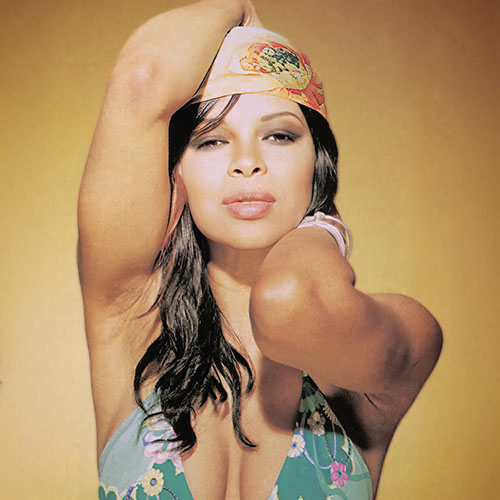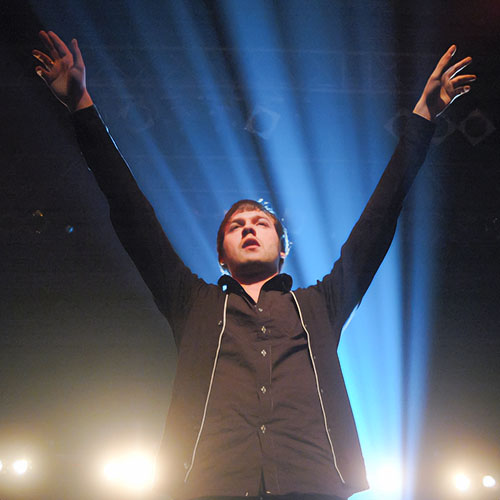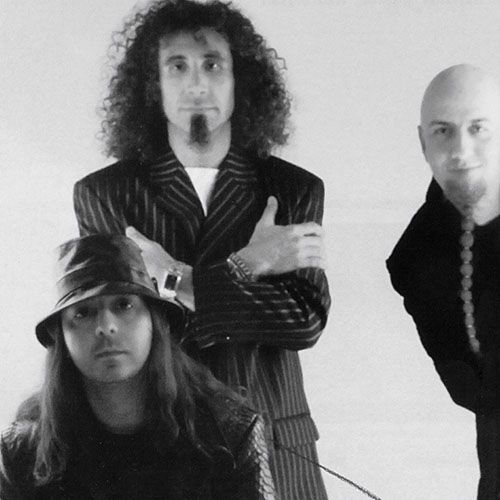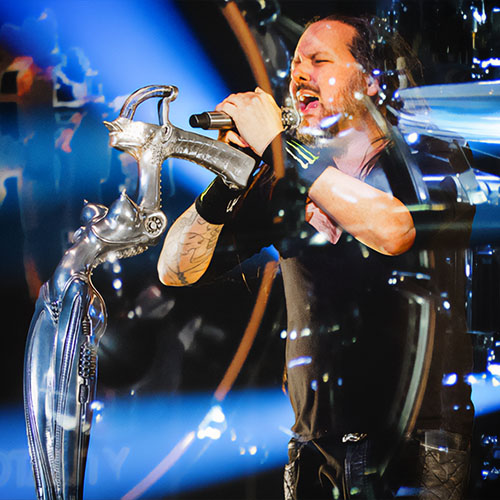Percussive. Thunderous. Aggressive. This multi-platinum nu-metal band is driven as much by the pleasures of the flesh as by the power of its message.
Severely Disturbed
The members of Disturbed remember the moment they knew they were finally rock stars. It was on a night in Grand Rapids, Michigan, when they encountered a fan who had all four of their faces tattooed on his right arm and lyrics from their songs winding through the portraits. The fan had them sign their autographs on his left arm so he could get those tattooed as well.
By the time the Chicago noise unit rolled into New York City last November for a sold-out performance at the Hammerstein Ballroom, its four members had received plenty more proof that they’d joined the ranks of the rock pantheon. In 2001 they’d appeared in or headlined one high-profile tour after another, including Ozzfest; their debut album, The Sickness, had sold more than two million copies in 18 months; and in just a few days they’d be doing their own one-hour concert broadcast on MTV.
Seated in their dressing room an hour before the Hammerstein show, the guys aren’t thinking about selling records or winning over audiences. They’re fixating on the same thing as are most red-blooded American males: what it would be like to get into Britney Spears’s pants.
As vocalist David Draiman scans a Rolling Stone cover shot of Britney Spears sitting on a dock in patched jeans, leaning over so far that her pillowy breasts nearly tumble out of her loose bra, he gasps, eyes glued to the magazine, “How’d you like to get lost in that valley right there?”
Someone in the road crew mentions that Britney claims she’s still a virgin. To which guitarist Dan Donegan counters, “That just means she hasn’t gotten fucked in the ass yet.”
“I have a dream,” blurts bassist Fuzz. “I’d like to come all over Britney’s tits and have Mariah Carey lick it off.” It’s one of his few comments the whole evening. Most of the time he lies face-down on a red and green patterned couch, his head covered by a black leather jacket. He’s only slightly less communicative than Donegan and drummer Mike Wengren. Draiman is clearly the voice of Disturbed, so much so that his bandmates act surprised later when they’re invited to partake in the interview.
When it comes to locker-room banter, however, they hold their own. As the conversation shifts away from Britney’s breasts to a more urgent matter — who they’ll each hook up with after the show — the whole group becomes animated. Draiman bitches about the caliber of women he’s seen carrying backstage passes. Wengren suggests sending a lackey through the crowd to snatch away the laminates of the gals who are not worthy. Then, as if it’s an after-thought, he bubbles about a sultry babe the band cavorted with in the past who is going to drop backstage after the show.
“But she’s fuckin’ married now,” grumbles Draiman.
“Yeah? Well the ring don’t block the hole,” says Donegan.
At first it seems this kind of randy repartee is as much a performance as Disturbed’s stage show. But if it’s a put-on, it couldn’t be more well-rehearsed. The off-color comments start shortly after the afternoon soundcheck and will continue well into the night. Even Draiman’s final words to his bandmates before taking the stage are flavored with lust.
“Please, God,” he says in mock prayer, closing his eyes and holding hands with Donegan and Wengren, “may we do a good show here tonight. And may there be lots of slutty women there for us. And may they come back to our hotel. And may we get our dicks sucked and leave with our stomachs full of alcohol.”
“People think there’s something wrong with you when you’re a black sheep amongst the white flock. They think that you’re an aberration a mutant.”
Considering the band’s obsession with tits and ass and partying, it’s a mite surprising their music isn’t all about getting fucked and fucked up. As soon as the houselights dim, it’s clear they have more serious issues on their minds. They begin the show by splashing a montage of historical images of hatred and oppression across a giant screen: Figures dangle from ropes at the Salem witch trials. People are beaten in the streets during the civil-rights movement. There’s a shot of a Turkish food vender with a sign that reads soup FROM ARMENIAN BONES, and stills of Saddam Hussein, Slobodan Milosevic, and Adolf Hitler. At the end of the short film, Draiman, dressed in the garb of a World War II concentration-camp victim, enters in the grasp of two Nazi storm troopers who drag him into a large glass chamber. The door closes. As the singer claws at the walls, the chamber fills with green gas. Draiman coughs, staggers, and collapses. Then, as his bandmates start banging out the opening riff of “Conflict,” he bursts out dressed in a black cape and starts to sing.
With his shaved head, piercings, and vest decorated with a red skull, he looks like a heavy-metal Nosferatu. When he sings, he jerks spasmodically from side to side as if being shocked, and between verses he throws his fist into the air to punctuate the pounding beats. His bandmates are nearly as dramatic. Donegan leans his whole body into his most powerful riffs, which echo through the stadium like machine-gun volleys. Fuzz bangs his head to the grinding rhythms, stopping only to run back and forth across the stage. A grinning Wengren bobs his head while battering his kit like a seal hunter clubbing prey.
Disturbed’s onstage energy is nothing new. Through the years, bands from Guns N’ Roses to Papa Roach have exhibited comparable charisma. But Disturbed has more to say than your average headbangers. Just a few minutes of serious conversation with Draiman makes it obvious that he’s too articulate and intelligent to water down his verse with meaningless rock-‘n’-roll cliches. Earlier in the afternoon, while his bandmates were chowing down, he explained how he views his art as a powerful therapy, not a key to the pleasures of the flesh.
“Kid Rock and Tommy Lee would say I’m full of shit, but I didn’t become a musician to have lots of sex,” he insisted. “The women are wonderful and I will always adore women. But for me, it really is about music and it really is about the catharsis and exorcising of demons.”
It’s also about the pushing of sonic boundaries. Like Sevendust, Godsmack, and Drowning Pool, Disturbed taps into the aggression and edge of neo-metal without resorting to rap or obscuring its groove with dissonant atmospherics. Draiman’s vocals combine raspy hooks with surging, percussive throat sounds that nicely complement his band’s pouncing rhythms. And Donegan’s crunchy, metallic power chords and eerie shards of guitar noise keep the songs churning. Add touches of whirring electronica and industrial clatter and you’re left with a band that transcends the sonic limitations of most of today’s metal.
“Their music is really strong,” says Godsmack vocalist Sully Erna. “It’s clear, it’s crisp-sounding, and it has a good, punchy groove to it.”
The Los Angeles Times gave equal approval: “These Chicago upstarts may have come out of nowhere, but this eight-legged groove machine puts the nu back into nu metal.”
Disturbed’s sound may indeed be visceral, but it is Draiman’s lyrics, shivering with angst, rage, and attempted redemption, that furnish the band’s true power. On “Fear” he warns of the dangers of complacency and ignorance; in “Down With the Sickness” he seeks empowerment in negative energy; on “Stupefy” he lambastes prejudice; and in “Violence Fetish” he encourages violent rebellion against the establishment. Draiman wants Disturbed to be a vehicle for others who have felt equally diseased, disaffected, and disillusioned. He strives to help them find meaning in chaos and healing in pain.
“We tend to deal with subject matter that’s a little bit more real, a little bit darker than many other heavy bands,” he says, swigging from a bottle of water. Seated with his hands in his lap, he looks relaxed but alert, like a cat that’s ready to pounce should it feel threatened. “The idea behind the name of the band and the title of our first album is all part of a unified theme,” he says, absently twirling one of two small metal tusk earrings that dangle from his chin. “‘The Sickness’ is a philosophy. It embraces individuality, self-development, and seeking out those things in life that bring you power. Unfortunately, when you do that in today’s world you set yourself apart from mass society. People think there’s something wrong with you when you’re a black sheep amongst the white flock. They think that you’re an aberration, a mutant, something that is sick and twisted and disturbed. And it’s that perception that in turn disturbs us — the fact that we cannot simply be without being scrutinized or persecuted.”
When Draiman talks, it’s with an instructional tone just shy of condescension. He might look like any other nu-metal wannabe, but he carries himself with a cocky self-assurance and charisma that makes even trite comments somehow seem important.
“May we do a good show… and may we get our dicks sucked and leave with our stomachs full of alcohol.”
“People throughout the course of history have been persecuted and exterminated for different ways of life,” he says. “That’s exactly what the band and the philosophy are about. The songs look at different aspects of human emotion and human behavior that are exhibited by everyone on a daily basis: fear, envy, greed, manipulation, not living life to the fullest. All these things are presented as a means of trying to show that they are perhaps not such a good thing. This is not the way you should live your life.”
A magna cum laude graduate from Loyola University in New Orleans, with degrees in political science, business administration, and philosophy, Draiman has culled his own philosophy from aspects of paganism, hedonism, and Judaism that he’s found personally liberating. He seeks power through spirituality and self-expression, and strongly believes people should indulge in whatever gives them pleasure — promiscuity, drugs, alcohol — as long as nobody else is hurt in the process.
For someone who embraces life and indulges in its many pleasures, the singer/songwriter seems unusually obsessed with despair. “The darkness in our music stems from the world,” he says, stopping to blow his nose in a tissue, then tossing the tissue over his shoulder into a corner of the room. “It is not as beautiful a place as most people would like to believe. It’s full of pain and suffering and death. Instead of running away from that, I choose to analyze it. I don’t harbor or make light of the darkness of the world. I deal with it by illustrating it, bringing it to the surface, and maybe making people recognize it for what it is.”
Draiman wasn’t always disturbed. Before his teens, he was fairly well adjusted, the product of a liberal upper-middle-class upbringing in Chicago. His paternal grandparents were Hasidic Jews from Brooklyn, but Draiman’s parents didn’t push his heritage on him. Even so, when he was in grade school he wanted to learn more about his religion, so he asked to go to a Jewish day school to learn the traditions and rituals of Judaism.
“I actually encouraged my family to become more religious because I found beauty in the Sabbath,” he says. “It was nice and comfortable. And I wanted that for our family.”
He got it, but received much more than he prayed for. When David Draiman was 14 his father’s business partner became involved in mail fraud, then disappeared just before the IRS lowered the boom. David’s dad was thrown in jail for two and a half years. Figuring God had punished him for not being more observant, Draiman Sr. became born-again. Upon his release, he pressured the rest of the family to become deeply religious as well, and packed David off to an Orthodox Jewish boarding school in Milwaukee.
“All I wanted to do was go to a normal high school where boys and girls were together and I could go see movies and read magazines,” the Disturbed vocalist says, a hint of anger seeping into his voice. “But the rabbis there wouldn’t let us open a newspaper because there might be an advertisement for lingerie. I was denied all the simple pleasures that most high school boys are accustomed to. I couldn’t talk to a girl or even look at one, and all this obsessive abstinence killed me, so I went to the opposite extreme and started fighting everything.”
Draiman was kicked out for delinquent behavior. Over the next few years he would be booted from three other boarding schools. The last was in Los Angeles, where he was caught with a bag of weed and a half-empty box of condoms at age 16. His time in L.A. wasn’t completely wasted, however. It was there that he became obsessed with loud music and joined his first band.
“It was this noisy punk group, and it was the perfect vehicle for rebellion,” he says, then smiles. “Music saved me in many ways. Even back then, it gave me that cathartic outlet.”
Draiman finally finished high school, then attended Loyola University, graduating in three and a half years. He moved back to Chicago, where he played in various punk and alternative bands. Then in August 1996 he saw an ad in a local newspaper that piqued his interest. He was around the sixtieth person to audition for a new rock group. “There was something about him that clicked with us right from the start,” says Wengren, who has now returned from the dining hall, his pointy beard flecked with bread crumbs. “A lot of the other guys would come out, and they’d want to take our demo tape home and a week later come back to play the songs. When David walked in he was like, ‘No, fuck the demo-tape thing. You guys just jam something and I’ll improvise.’ I was completely taken aback, but we tried it, and that very first thing that we did became a song called ‘The Want,’ which is on our record.”
Draiman brought more than a voice to the project. He convinced his band-mates to change their name to Disturbed, figuring it was a good match for their hostile sound. Because they were signed only two years ago to Giant records, many people think they were an instant success. But Disturbed’s overnight success was actually 12 years in the making.
Donegan, Wengren, and Fuzz had started out in the late eighties as struggling musicians in different local metal bands. At the time, the Chicago music scene was overrun with alternative outfits that hoped to be the next Smashing Pumpkins. As a result, the shunned metal community was small and tight-knit. Bands shared practice spaces, opened shows for one another, mixed together onstage. Donegan, Wengren, and Fuzz became close friends. In 1990, when Donegan’s and Wengren’s bands broke up, the two decided to form their own group. They invited Fuzz to join them, and went through a variety of half-assed singers before finding Draiman. They certainly weren’t catapulted into instant fame.
“We worked for over four years to get any recognition,” says Wengren. “We used to play at this place called Champs, on the south side of Chicago. We’d have a good night if 200 people showed up. We’d spend the whole week busting our asses at our day jobs and look forward to our little weekend gigs. And that was the best thing in the world for us.”
If Draiman is the soul and psyche of Disturbed, his bandmates are the internal organs that power the machine — the energy and groove that make Disturbed sound so powerful. “We all offer a lot to this band. When we’re writing, there’s a collaboration between all of our ideas,” says Donegan, thumbing his goatee. “It’s just a matter of starting things off. Usually I’ll bring in a guitar riff to the guys and we’ll feel it out and improvise off that. When we put stuff together, we never discuss what we wanted it to sound like, we just vibe.”
In the corner of the dressing room, away from a table loaded with bottles of vodka, wine, beer, and whiskey, sit an electronic drum kit, a guitar amp, and a portable digital recording system. It’s here that Disturbed works on new material while on the road. So far, they have completed only a few new tracks for an album they plan to have out later this year, but the four of them say they’ve already noticed musical growth.
“I don’t think our songs are going to start sounding like R.E.M. or anything, but I’d like to see us expand what we do and bring new things to the table,” says Donegan. “It’s hard, because there’s a certain level of success we feel we have to live up to, but we’re not thinking about trying to top [hits like] ‘Stupefy’ or ‘Down With the Sickness,’ because we never even thought those songs would make it to radio when we wrote them.”
“All the time we’ve spent together on the road can only make us better song-writers.” says Wengren, plucking an oatmeal cookie from a basket on the table. “We’ll just experiment with stuff, and whatever comes out of us naturally is what we’ll go with.”
Unlike their front man, who likes to pontificate and theorize, the three others believe in the Spinal Tap edict of rock: “Have a good time all the time.” Even though Wengren is exhausted from too much touring, he’s not about to miss the late-night entertainment. Before soundcheck, when the road manager asked him if he would feel better if he went back to the hotel early, Wengren replied, “Fuck it, after this long on the road I’ll look like this whether I drink or not. I might as well get wasted.”
When he’s not being pensive, Draiman is happy to join the decadent fun. Tonight, after the concert, the fellows head back to the dressing room to open some bottles of booze and live the rock life. Only a few girls make it backstage, and none seems like fair game. One is nearly glued to her boyfriend, and the others make it clear from their body language that they’re the worst type of groupies: the abstinent kind. So the musicians and their crew spark up a couple of joints and pass them in opposite directions around the room, practically guaranteeing that by the time someone exhales he’s being handed another fragrant spliff. Unable to score chicks, the guys in the band reminisce over past conquests.
“When we played Detroit we had at least one girl on everyone in the band in a different part of the bus.” says Wengren. “Two of us had two girls each and the other two had one each.”
Draiman turns to Donegan, a mischievous glint in his eye. “I’m thinking you like being walked in on cuz you were right there in the front of the bus and everyone kept walking in on you.”
“Dude, there was nowhere else to go,” snaps Donegan. “She’s going down on me and the front door was opening, and I’m there with a stupid expression on my face going, ‘Hey, how ya doing?’”
“No way, maaaan,” says the singer. “You could have gone to your bunk and just stuck your dick out. But you wanted to show off.”
When it comes to sex, Donegan, Wengren, and Fuzz act on instinct. Draiman also gets down and dirty, but he tends to be a little more philosophical.
“I really can’t understand people who are moralistic about sex,” he says. “If two people can bring pleasure into a life — the majority of which is not necessarily pleasurable — than how foolish you are to prevent that from happening. There’s not much that’s more intense than the energy exchange that occurs between two people when you’re having sex. When you can look into your partner’s eyes at the moment of orgasm and see the energy that is passing between the two of you — that’s a beautiful thing. The only thing I can think of that’s better than that is performing onstage.”
It’s about 90 minutes after showtime. Four joints have been smoked to the roach, and now the band and its posse are passing lit bowls around the room. In a haze of marijuana smoke, Draiman sighs and bows his head. With the hour growing late and not a willing woman in sight, hooking up at this point is becoming a real longshot.
In a last-ditch effort to score, the guys pile into a van and their tour manager drives them to an East Village absinthe party emceed by a midget band. When they arrive, they find that they can’t get in because their names aren’t on the list. Apparently, rock-star perks only go so far.
Stoned and dejected, they lumber back into their van and head to their hotel. They may have conquered the Hammerstein Ballroom crowd tonight, but the only action they’ll see before dawn will be on Spectravision. Draiman is clearly disappointed, but he knows failure is just part of the game, and tomorrow there’ll be a whole new city to challenge Disturbed’s libido. As Draiman presses the elevator button to head up to his room, he coughs and concludes, “Sometimes it’s good not to hook up. I like the hunt and the excitement of the chase. When it’s really simple and it’s a gimme, it’s almost like, why should I bother? But when there’s the anticipation and everything that leads up to the actual closing of the deal, that’s what I look for. That’s what gets me off.”
Having never been introduced to the musical organization Disturbed before putting together this legacy article for the site, one of the fine (younger) people in the group took it upon herself to provide some education for the rest of us. It turns out they still have an active touring schedule on their site should you wish to enchance your own education. We will offer up one comment from the room upon viewing the video collection on the home of “disturbed1” however: “Dang. That ain’t Garth.” [True. Really nice videos, though. First rate. -Ed.]






















